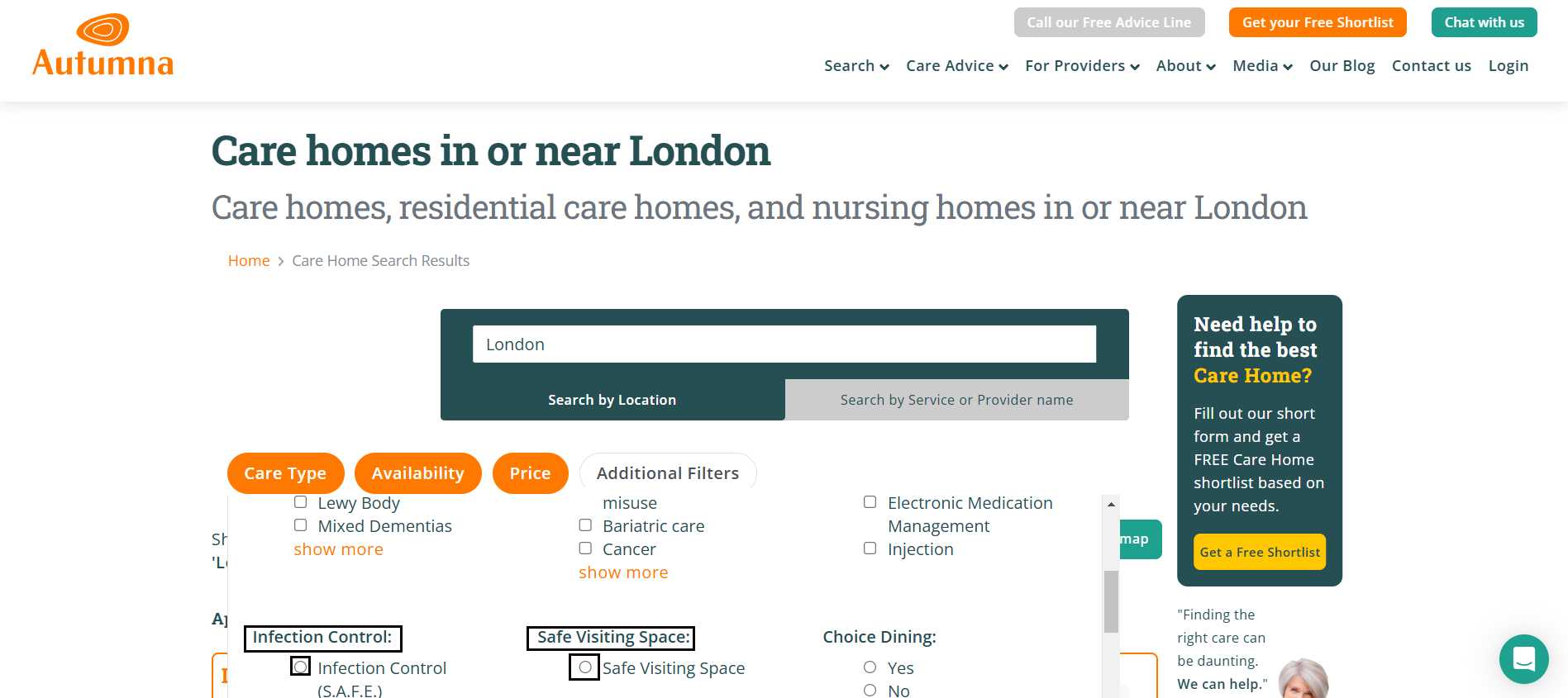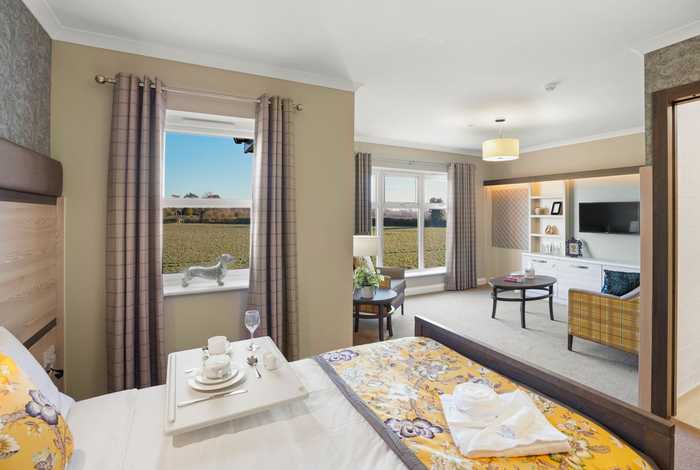Posted by Janine Griffiths
How to choose a care home for your loved one

In our previous blog we explored the importance of narrowing down options, arranging visits, and assessing the quality of care when trying to find care for a loved one.
While that advice remains vital, the care landscape has evolved. Families now face new considerations as they navigate this important decision.
This updated guide on how to choose a care home for your loved one builds on the foundation of our earlier blog, introducing fresh insights to help you make an even more informed choice.
From personalised care to emerging trends, these tips will ensure you’re fully prepared to select the best care home for your loved one.
Key updates and new considerations
As the landscape of elder care continues to evolve, so too do the factors that families must consider when choosing a care home. In this section, we highlight some of the key updates and new considerations that have emerged over the last few years.
Personal care plans
Personalised care was first introduced in 2019 as part of the Long Term Care Plan by the NHS. In the years following, it has been gradually adopted by social care providers across the country to improve the quality of care they give to patients.
The COVID-19 pandemic further emphasised the importance of tailored care, as providers sought to adapt quickly to individual needs in a rapidly changing environment. With increased focus on vulnerable populations, the demand for personalised care has grown, highlighting the critical role it plays in ensuring both the safety and wellbeing of residents.
Of course, every individual’s needs are unique, and modern care homes increasingly recognise this by offering highly personalised care plans. These plans go beyond basic health requirements, encompassing cultural, dietary, and social preferences. Choosing a care home that takes the time to understand your loved one’s lifestyle and values can make a significant difference in their wellbeing and happiness.
When choosing a care home for your loved one, make sure to enquire about their approach to personalised care plans and whether they provide person-centred care that addresses your loved one’s specific needs and preferences.
Technology
Technology now plays a pivotal role in improving the quality of life in care homes. From digital care planning tools to assistive devices like sensor technology, many care homes use tech to enhance safety and communication. For example, video calling facilities can help your loved one stay connected with family, while digital medication tracking ensures accurate care delivery.
Although sensor technology and digital care planning tools have been in use for many years, their adoption has accelerated significantly in recent years. The COVID-19 pandemic underscored the need to reduce in-person contact, prompting care homes to embrace these technologies more widely. This shift has not only enhanced safety and efficiency but also demonstrated how innovation can maintain strong connections and deliver high-quality care, even in challenging circumstances.
Many families understand how technological innovations can significantly enhance their loved ones' care, while also helping them stay connected with those they hold dear.
If these modern tools are important to you, make sure to choose a care home that incorporates them into their services.
The impact of COVID-19 on care homes
The COVID-19 pandemic highlighted both the resilience and vulnerabilities within the care home sector, prompting significant changes that have reshaped the way care is delivered. One of the most crucial lessons learned from the pandemic was the need for heightened awareness of infection control and hygiene practices. In response, care homes have implemented stricter protocols to ensure the safety and wellbeing of residents, with enhanced cleaning procedures, improved ventilation systems, and more rigorous monitoring of staff health.
Moreover, the pandemic served as a catalyst for increased regulation and oversight within the sector. Governments and industry bodies have since introduced more stringent guidelines to prevent outbreaks and safeguard vulnerable populations. These measures not only aim to reduce the risk of future infections but also ensure that care homes are better equipped to handle potential crises, with more robust contingency plans in place.
Ultimately, while the pandemic exposed critical gaps in the system, it has also sparked a renewed focus on improving care home standards. This heightened attention to infection control, combined with stronger regulations, offers greater reassurance to families seeking a safe and supportive environment for their loved ones.
Autumna makes it easy to search for care homes with robust infection control and safe visiting spaces. Simply head over to our directory, enter your location and click on Additional Filters.
Under Additional Filters, check the box under ‘Infection control’ and ‘Safe visiting space.’

Click Search Again.
Questions to ask during visits
When visiting potential care homes, it’s easy to focus on the obvious factors like facilities, costs, cleanliness, activities and staff qualifications. Of course, all of these things are important, but in addition, there are other crucial questions that are often overlooked which can provide deeper insight into the overall quality of care.
Start by asking about staff turnover rates. High turnover can be an indication of underlying issues such as poor working conditions or a lack of support for staff, both of which could affect the consistency of care your loved one receives.
Another important area to explore is access to mental health support. Many residents in care homes may experience feelings of isolation or anxiety, especially during transitions. It’s vital to know whether the home has mental health services available, such as counselling or social support, to ensure your loved one’s emotional wellbeing is cared for.
It is also a good idea to enquire about how the care home handles resident feedback. Does the home encourage residents and their families to share their thoughts and concerns? A care home that actively seeks feedback and acts on it demonstrates a commitment to continuous improvement and resident satisfaction.
Finally, take the time to gauge the atmosphere and community spirit of the home. Spend time observing how staff interact with residents, how people in the home engage with each other, and whether the overall environment feels warm and welcoming. A positive, caring atmosphere is essential for creating a sense of belonging and happiness among residents.
Financial transparency
Understanding the full cost of care is crucial when choosing a care home, as fees can vary greatly depending on the level of care required and the facilities offered. Financial transparency is key to avoiding any unexpected costs down the line.
When considering a care home, be sure to ask for a clear breakdown of all fees and charges, including additional costs for services such as laundry, activities, or personal care. Some homes may advertise a base rate, but there could be extra charges for more intensive care or specialised services. Make sure you understand exactly what is included in the initial fee and what might be an additional cost.
It’s also important to ask about payment options and whether the home offers any flexibility or assistance in covering the costs. Some care homes may work with financial advisers or offer guidance on how to access funding, including government support, grants, or insurance.
If you’re unsure about the financial implications, consider seeking advice from a professional. Many organisations and independent financial advisers specialise in elder care funding and can help you understand your options, whether you are looking for ways to reduce costs or need advice on long-term care planning.
Being fully informed about the financial aspects of a care home ensures that there are no unpleasant surprises and that you can make a well-rounded, confident decision.
Exploring short-term or respite care as a trial
One of the most effective ways to assess a care home before making a long-term commitment is by exploring respite care or short-term stays. These trial periods allow you and your loved one to experience the care home environment firsthand, without the pressure of a permanent decision.
For families, this can be invaluable in gauging whether the care home meets expectations and offers the level of comfort and support that your loved one needs.
On the other hand, short-term stays can be an excellent way for residents to adjust to a new environment gradually. It allows them to become familiar with the routine and build relationships with staff and other residents. This can ease the transition to long-term care and make it less overwhelming.
Ultimately, using respite care as a trial offers peace of mind for both families and residents, ensuring that when the time comes for a permanent decision, you’re confident in your choice.
Empowering your care home decision
This guide has introduced several key updates and considerations to help you navigate the process of choosing the right care home for your loved one.
These insights aim to equip you with the knowledge needed to make an informed decision.
As you move forward, remember to combine these new tips with the foundational advice from our previous blog. Together, they provide a comprehensive approach to selecting a care home that truly meets your loved one's needs, values, and preferences.
Looking for a care home?
Receive a Free Care Home Shortlist!
Let our expert team of advisers get your search off to a great start.
Tell us a little about your needs and we'll send you a bespoke shortlist of care homes! Click the button below to begin, it takes just a few minutes.
For more information, you can also contact our advisors on 01892 335 330.
Other articles to read
From the blog

Older Persons Care Advice
Ultimate guide to care homes in Norwich
April 23rd, 2025
Discover the best care homes in Norwich—explore lifestyle-focused options, top-rated services, and how to choose the right home with confidence.

Older Persons Care Advice
How to find an adult day care centre near you
April 22nd, 2025
Looking for an adult day care centre near you? Discover how to find safe, joyful care for your loved one—and support for yourself—on Autumna.

Older Persons Care Advice
How to shortlist care homes in Exeter
April 17th, 2025
Need help shortlisting care homes in Exeter? Learn how to filter options with confidence, compare homes, and find the best fit with Autumna’s free tools.
Frequently Asked Questions
Personalised care plans are plans that caters to your loved one's needs through a series of guided discussions with the individual and their loved ones to develop personalised health and wellbeing plans.
Tools like video calling, sensor tech, and digital medication tracking improve safety, communication, and connection in modern care homes.
Enquire about counselling services, staff training in emotional support, and activities designed to promote mental health and reduce isolation.
Respite care offers short-term stays, letting you assess the home's environment, staff, and services before committing to long-term care.
The UK's largest & most detailed directory of elderly care and retirement living options
10,445
Care Homes
12,390
Home Care Services
1,671
Live-in Care Services
1,826
Retirement Living Developments
Autumna is the UK's largest and most comprehensive later-life living & elderly care directory. Our detailed search facility and team of expert advisors can help you find the best care homes, nursing homes, retirement homes, retirement villages, home care, and live-in care services for you or your loved one's needs. Our website is free to use, we are proudly independent, and we never take referral fees.






